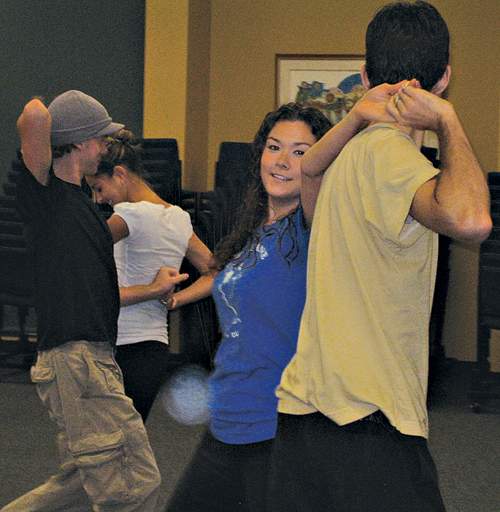 Gainesville Sun Article
Gainesville Sun Article
Note that this article is about dancing on the Reitz Union colonnade on Tuesday nights, even though the picture is from dancing at Hillel on Wednesday nights. Also, the original picture was replaced with the enlarged version.
The original article is at http://www.gainesville.com/article/20071008/NEWS/710080309.
Israeli dance class held weekly
By BROOKE ELLIS
Campus correspondent
12:00 am, October 8, 2007
For Ariela Notzer, Israeli dancing - with influences from salsa dancing, the cha-cha step and ballroom dancing - is a workout.
Notzer, assistant professor in the University of Florida's College of Dentistry, said, "Israeli dancing is the best exercise in the world because of the music."
She participates in weekly dance classes at the Reitz Union Colonnade with her 16-year-old daughter, Inbal Guelmann.
Free classes are held Tuesday nights from 7 to 9 p.m. colonnade to anyone who wants to participate, and non-students are welcome.
The classes are sponsored by Messianic Jewish Fellowship, a religious on-campus organization.
The classes are informal, Notzer said.
"Jewish time is not an exact time," she said, explaining why the dancing may not start exactly at 7 as people trickle in late.
During a recent class, 19-year-old Kara Walters led the group in the dances by calling out the steps. Beginners followed along by watching everyone else.
Every week, the amount of people who come to the class varies.
Joe Simpkins has been participating in Israeli dancing for nine years with his 28-year-old son, Joseph Simpkins, who met his fiancee at an Israeli dance gathering, and now they come together to the classes at UF.
The elder Simpkins [and the younger one] went to Israel for the Karmiel festival, a seven-day workshop at which new dances are taught, to become qualified to teach Israeli dancing in the U.S.
He likes that the classes are held in public outside because people who pass by can join in.
There have been as few as four or as many as 25, Simpkins said of the class, which has been taught at UF now for two years.
Notzer said that's part of the class's appeal.
"You never know how many people are going to show up," she said. "That's part of the fun. We just go with the flow."
The dancing used to be more religious when it was started in the 18th century, but now it's more secular and cultural, Notzer said. Israeli dancing also incorporates line dancing, partner dancing and circle dancing.
She said it is popular all over the world in places people wouldn't expect, like Europe, Australia, Japan and South Korea.
Guelmann, Notzer's daughter, has been taking the class at UF for several months and said she prefers the newer dances with upbeat music that other people her age enjoy.
Her first day of learning was difficult, she said, but the more basic steps she learned, the quicker she got a sense of the advanced-level dances.
"We are here for the fun of the dancing," Notzer said. "We aren't a performing group."
